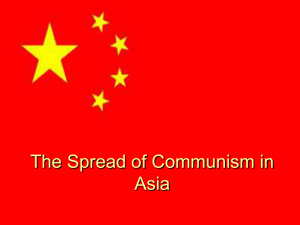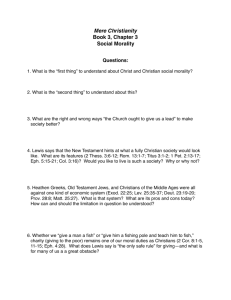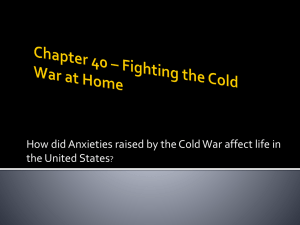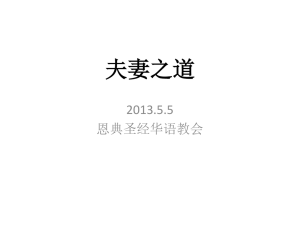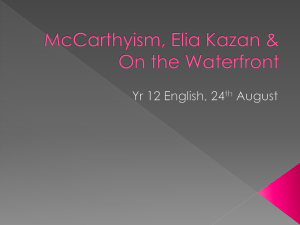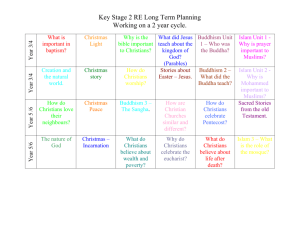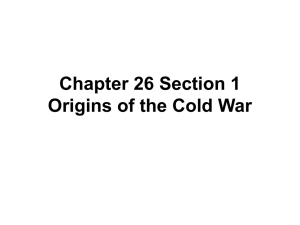Interview Transcript
advertisement
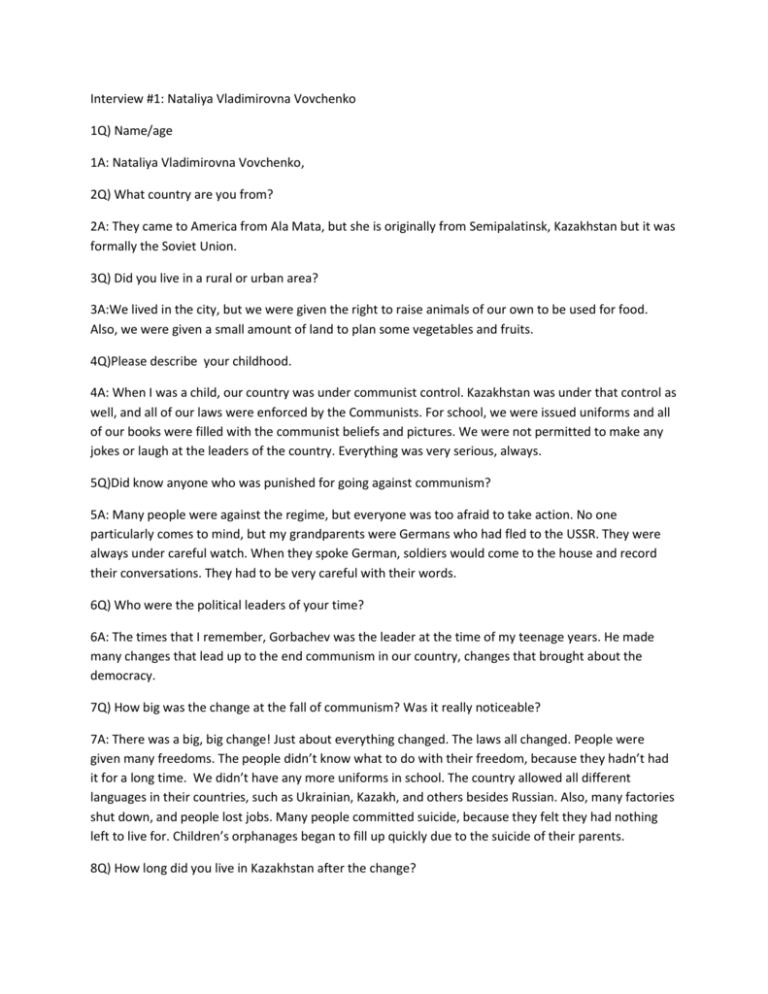
Interview #1: Nataliya Vladimirovna Vovchenko 1Q) Name/age 1A: Nataliya Vladimirovna Vovchenko, 2Q) What country are you from? 2A: They came to America from Ala Mata, but she is originally from Semipalatinsk, Kazakhstan but it was formally the Soviet Union. 3Q) Did you live in a rural or urban area? 3A:We lived in the city, but we were given the right to raise animals of our own to be used for food. Also, we were given a small amount of land to plan some vegetables and fruits. 4Q)Please describe your childhood. 4A: When I was a child, our country was under communist control. Kazakhstan was under that control as well, and all of our laws were enforced by the Communists. For school, we were issued uniforms and all of our books were filled with the communist beliefs and pictures. We were not permitted to make any jokes or laugh at the leaders of the country. Everything was very serious, always. 5Q)Did know anyone who was punished for going against communism? 5A: Many people were against the regime, but everyone was too afraid to take action. No one particularly comes to mind, but my grandparents were Germans who had fled to the USSR. They were always under careful watch. When they spoke German, soldiers would come to the house and record their conversations. They had to be very careful with their words. 6Q) Who were the political leaders of your time? 6A: The times that I remember, Gorbachev was the leader at the time of my teenage years. He made many changes that lead up to the end communism in our country, changes that brought about the democracy. 7Q) How big was the change at the fall of communism? Was it really noticeable? 7A: There was a big, big change! Just about everything changed. The laws all changed. People were given many freedoms. The people didn’t know what to do with their freedom, because they hadn’t had it for a long time. We didn’t have any more uniforms in school. The country allowed all different languages in their countries, such as Ukrainian, Kazakh, and others besides Russian. Also, many factories shut down, and people lost jobs. Many people committed suicide, because they felt they had nothing left to live for. Children’s orphanages began to fill up quickly due to the suicide of their parents. 8Q) How long did you live in Kazakhstan after the change? 8A: It was the end of 1989/ beginning of 1990. We left in 1996, so we lived there for about 6 more difficult years. Interview #2: Gennadiy Gerasenko My name is Gennadiy Gersenko. I was born in Novosibirsk. I have 8 brothers and sisters and they are all still alive. Novosibirsk is a grand, flourishing city. More than 2 million people live there. When we lived there, it was the center of many tank and car factories. It was a city of many educated people. It was a place of learning, and I lived there. I went to school and made new friends. While I was in school, my parents became Christians. After our tenants found out that we were Christians, they kicked us out of our apartment. We had to find our own place to live. No one would take us in, since we were Christians. My parents needed to find a place to stay quickly because we had a large family, but as you can tell it was a very difficult time for them. While I was growing up, I had seen my parents be regular people. I saw them do the things that everyone’s’ parents did. They drank, danced, and argued. It was all the usual behavior, until my parents became Christians. My father and I bonded closer, and one day we went on a walk. A boy was crossing the street with us and we both saw him. My father asked me if I knew the boy, and of course I had, since we were in school together. Well, I ended up calling him “a bogomol”, or in English “the praying mantis”. Other children made fun this boy because he came from a Christian family. My father patted me on the head for call him that name, but at the time I didn’t know that my parents had changed. Then, I found that I would soon be made fun of like that. When children began school, they started with 1st grade. In a few short months, they were accepted into the group called “The Octobrists”. The revolution had occurred on October 17, and the country always remembered this day. The children were given special red star pins with Lenin’s face on it. It was made out to be a special day, but not all the children had to be in the Octobrist group because some families were Christians. These children were made of fun of, and special conferences were held with teachers and the students. These children were in 1st grade! It was ridiculous to put such pressure on small children. Anyway, the teachers still tried to find ways to convince them to join the group. When the children came up to the third grade, April 22nd was the day when they became “Pioneers” instead of “Octobrists”, because this is Lenin’s birthday. They received red scarves with three corners. They accepted anyone into this group. The three corners represented Pioneers, Komsomols, and Communists. The scarf represented unity. The wearer of the scarf was basically saying they were ready to fight for the cause of communism at anytime. In the 7th grade, they were moved up to the “Komsomol” group. They were “the younger brothers and sisters of communists, but the older brothers and sisters of Octobrists and Pioneers”. These children were privileged to many special occasions and rewards. It was very difficult for Christian children to go to school. They were discriminated, and they were not allowed to do certain things. Christian children could not go on to higher education, or get higher paying jobs. Another thing that was terrible about the communist regime was that the teacher of the classroom was paid the same amount as the woman who cleaned the school at the end of the day. Only on a few occasions did better jobs get more money. For instance, engineers got paid more than teachers, but not by much at all. We were very worried for our family. Our children would have to go through the same worries which we had to go through. We wanted our children to be safer, and happier growing up. Christians were found as enemies of the Soviet Union. Many times they called us “Americans and friends of Americans”. We had never even known who Americans were! They only called us that because at the time, the Americans were enemies of the Communists. The Christians were honest people. They had honest work and they went to church. They only wanted to live their lives decently. Christians were viewed as enemies because they wanted change. They were looked at as “Capitalists”. In schools, I remember the teachers telling us about the changes “soon to come”. They told us that we needed to sacrifice for our country’s sake. That meant that we needed to care less about ourselves and more about the communist cause. They told us that meant we needed to eat less, and give our best to the government. My family came here in 1989. We saw that we were being treated differently. We wanted to work right, and serve God in the right way. We could not do that in the USSR. We saw the wars and how sad everything was. We decided that moving to a different country was every person’s right. We moved here and we love life here. We pray for this country and the people of this country. For us, this is our home. When we lived there, we loved hard work there and it’s very nice to be able to work hard here as well, but be treated with more respect. Interview #3: Nina Zhdanov Hello dear children! I am a great-grandmother already. I was born in 1925, and I’m 85 years old now. I was born at the time of Stalin’s reign. What can I say? I have forgotten a lot, but I will try to remember as much as I can. Stalin “wanted to help people and make things equal”; he said he didn’t want there to be a division between the poor and rich people. This obviously still happened, because the communists took over, and took everything from everyone, making themselves rich and everyone else poor. The rich people from the past, whose things were taken away, were sent to Siberia where there was only wilderness and wild animals. The life out there was not easy for anyone, for young or old. There was not much to eat either and many people starved. My father had 2 cows and 2 horses, since everyone at the time had to work the soil to get crops for money or food. Before the government could take away our animals, my father was able to sell a cow. He was found out, and sent to court. The Kolkhoz took everything. That was the hardest time for everyone. Everyone was starving. 1930, 31,32, and 33 were the years of the worst famines. You have to understand what starvation feels like. People got poorer and poorer. They had not belongings or land. Now this was really a big turning point with the Communists. People could get jobs in the cities, but if they were 15 minutes late to work, they would be sent to court and put into jail. That was all during 1937,38, and 39. Then the war began. In 1941, Stalin and Hitler made a peace treaty for 20 years, to avoid war, but Hitler still went to war with Russia. He knew that we were not ready for a war at all. Hitler was able to capture cities and land quickly, but he could not take over Moscow. There were many difficult battles. America and Great Britain then came to fight against the Germans as well. We were forced to live under German oppression for some time. It was not an easy time, either. When the Germans left, it was a little better. Stalin’s laws were still in effect, however. In 1954, Stalin died, but his regime still followed till 1991. Many things changed. Live was hard, children. Cherish the bread you have. Bread is life. Right now you don’t understand how important it is. Only put on your plate as much as you can eat. Cherish bread.
